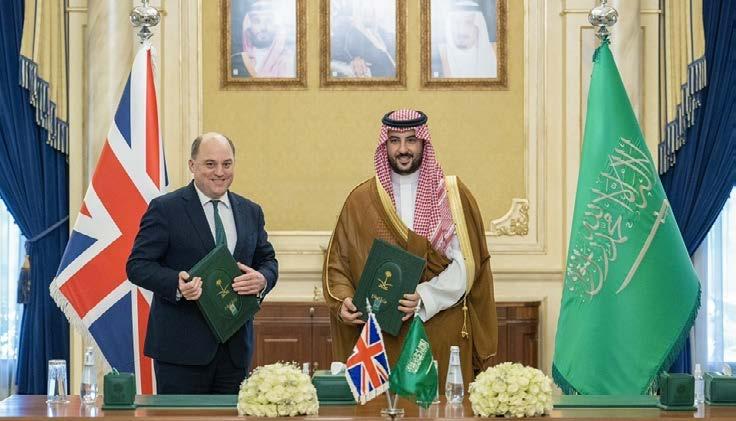
3 minute read
SAUDI ARABIA AND UK SIGN NEW AGREEMENT DURINGDEFENCE MINISTER’S VISIT
£10.7 MILLION IN FUNDING FOR LOCAL AUTHORITIES TO IMPROVE AIR QUALITY
44 projects will receive funding as part of wider Government action to protect public health and the environment by improving air quality.
Advertisement
Local authorities across England have been granted almost £11 million in the latest round of funding for projects that will improve air quality.
The money, from the Government’s annual Air Quality Grant, helps councils develop and implement measures to benefit schools, businesses and communities and reduce the impact of air pollution on people’s health.
This year’s grants total £10.7 million, with funding supporting programmes that will educate doctors, nurses and social care workers about air quality; electrify a diesel refuse collection vehicle and procure an electric road sweeper in Blaby, Leicestershire; and roll out monitoring sensors to make real-time air quality information available to the public in Lewisham, south London.
On Tyneside, a long-term campaign aimed at schools and pollution hotspots in residential areas will educate people of all ages about the dangers of air pollution, whilst an Air Quality Officer will be employed in Cornwall to visit schools. Funding will also support an e-cargo bike library, helping local businesses in Norfolk to cut operating costs while lowering their emissions; and the implementation of a river freight scheme in Westminster which will serve as a greener alternative to the use of more polluting vehicles in the city.
Environment Minister Rebecca Pow said: We have made great strides in tackling air pollution at a national level since 2010, but we must do more to improve air quality and protect public health.
From Tyneside to Cornwall, this funding will support a range of inspiring and innovative projects across the country – stepping up our monitoring of harmful pollutants, educating the public and boosting the use of green transport.
This builds on our world-leading Environment Act commitments that will enhance our natural environment and safeguard public health for future generations.
The government is taking decisive action to cut air pollution. Through the Environment Act, the government has set two legally-binding targets to reduce the level of fine particulate matter (PM2.5) – the most harmful pollutant to human health – in our air by 2040.
The Environmental Improvement Plan – published last week to build on the vision set out in the government’s 25
Year Environment Plan – set out interim targets to reduce concentrations of, and reduce public exposure to, PM2.5 by the end of January 2028, alongside a range of policies to work towards these targets.

The Plan also committed to challenging councils to improve air quality more quickly by assessing their performance and use of existing powers, while supporting them with clear guidance, funding and tools. Moreover, it pledged to improve the way air quality information is communicated with the public. Today’s announcement demonstrates key steps forward in the delivery of these commitments.
This latest grant funding means that around £53 million has been awarded across almost 500 projects through the Air Quality Grant scheme since 2010. £883 million has been made available as part of the government’s NO2 Plan to support local authorities in cleaning up transport and cutting levels of nitrogen dioxide down to legal levels in the shortest possible time. More widely, the government has already spent over £2 billion to support the move to zero emission vehicles, helping drive forward the decarbonisation of the UK’s entire transport system. Funding is available from the Department for Transport for local authorities, as well as businesses, charities, private rental accommodation, flats and social housing with off-street parking spaces, to install electric vehicle chargepoints and infrastructure. These actions will deliver better air quality for all.
Together, these projects have contributed to the significant improvement in air quality seen in the UK in recent decades.
Since 2010, emissions of fine particulate matter have fallen by 18%, while emissions of nitrogen oxides have fallen by 44% and sulphur dioxide by 70%.
The Secretary of State for Defence the Rt Hon Ben Wallace MP is visiting the Kingdom of Saudi Arabia (28 February to 2 March). The Defence Secretary held a number of bilateral meetings, including with HRH Prince Khalid bin Salman, the Minister for Defence of the Kingdom of Saudi Arabia; and others in the Saudi government.
It was an opportunity to reflect on the strength and depth of the UK-Saudi partnership, including following the signing of the Defence Cooperation Plan in December 2022. The Defence Secretary reaffirmed the UK’s enduring commitment to work with the Kingdom of Saudi Arabia, with discussion of how to enhance the bilateral relationship yet further in support of regional stability and security.
Defence Secretary Ben Wallace expressed his gratitude to Saudi Arabia following the recent commitment of $410 million in aid for Ukraine, announced during Foreign Minister HH Prince Faisal bin Farhan Al-Saud’s visit to Kyiv last weekend.
Defence Secretary Ben Wallace said:
It was a pleasure to meet with HRH Prince Khalid bin Salman, the Minister for Defence of the Kingdom of Saudi Arabia and build on the long history of UK-Saudi defence collaboration. The Statement of Intent signed today will strengthen our SaudiUK combat air relationship and our ability to address shared security challenges for decades to come, supporting Saudi Vision 2030 aspirations. The Defence Ministers signed a Statement of Intent (SOI) during the visit, which will initiate a Partnering Feasibility Study to explore how we can best position our decades long combat air relationship for the future. Both Governments confirmed a common desire for closer industrial collaboration, to develop key capabilities and boost prosperity in both nations, including in support of Saudi Vision 2030 objectives.




